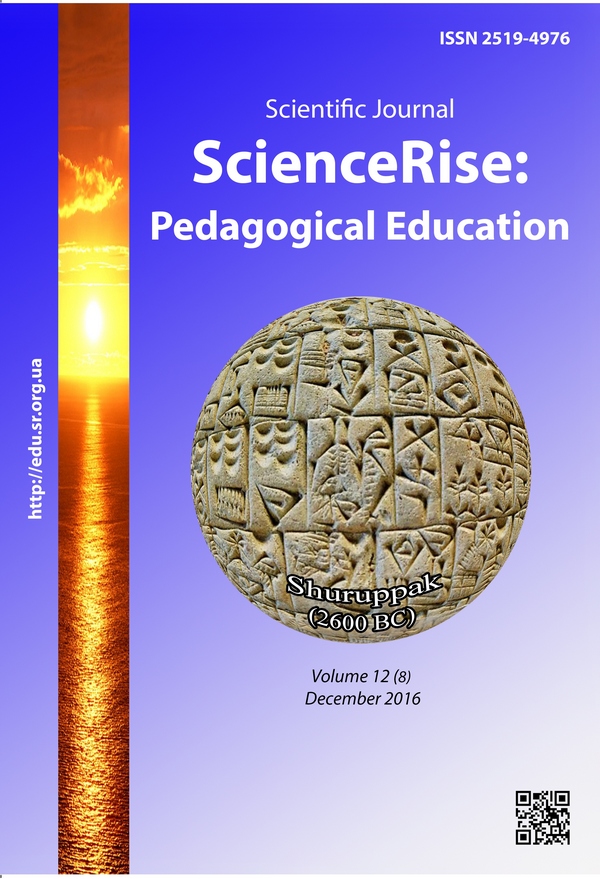Розробка методики застосування етимологічного аналізу на уроках української мови в початкових класах
DOI:
https://doi.org/10.15587/2519-4984.2016.87719Ключові слова:
етимологічне пояснення, етимологічний аналіз, походження слів, первісна форма, уроки української мовиАнотація
У статті підтверджено ефективність експериментальної методики застосування етимологічного аналізу на уроках української мови в початкових класах. Проблема дослідження є актуальною і полягає у педагогічному і методичному обґрунтуванні етимологічної роботи зі словом, вивченні походження й розвитку слів; поясненні походження слова зіставленням його зі спорідненими словами тієї ж або інших мов, розгляд первісної форми й значення слова
Посилання
- Postanova «Pro zatverdzhennja Derzhavnogo standartu bazovoi' i povnoi' zagal'noi' seredn'oi' osvity» (2011). Kabinet Ministriv Ukrai'ny. Available at: http://zakon2.rada.gov.ua/laws/show/1392-2011-%D0%BF
- Ukrai'ns'ka mova. Navchal'na programa dlja zagal'noosvitnih navchal'nyh zakladiv 1–4 klasy. Pojasnjuval'na zapyska. Available at: http://mon.gov.ua/without%20SD/Програми/1-ukrayinska-mova-1-4-klas.lyuba.doc
- mon.gov.ua/content/Новини/.../3-perelik-pochatkova-shkola-2015-2016.doc
- Kudrjashjova, M. G. (2001). Slovoobrazovatel'nyj analiz v sisteme razvivajushhego obuchenija. Nach. shk., 10, 71–75.
- Ganych, D., Olijnyk, I. S. (1985). Slovnyk lingvistychnyh terminiv. Kyiv: Vyshh. shk., 360.
- Ponomariv, O. D. (1992). Etymologija. Stylistychni mozhlyvosti vnutrishn'oi' formy slova. Kyiv: Lybid', 112–121.
- Kolomijec', V. T. (1992). Typologichni rysy ukrai'ns'koi' literaturnoi' movy na foni inshyh slov’jans'kyh mov. Movoznavstvo, 7, 4–8.
- Trubachov, O. N. (2004). Trudy po jetimologii: Slovo. Istorija. Kul'tura. Vol. 1. Moscow: Jazyki slavjanskoj kul'tury, 800.
- Mel'nychuk, O. S. et. al. (Eds.) (1982–2006). Etymologichnyj slovnyk ukrai'ns'koi' movy. Vol. 1-5. Kyiv: Nauk. dumka, 634, 573, 552, 656, 516.
- Voskresens'ka, N., Svashenko, A. (2000). Etymologichnyj analiz, jak zasib pidvyshhennja piznaval'nyh interesiv ta gramotnosti uchniv. Ridni dzherela, 4, 18–22.
- Vvedenskaja, L. A., Kolesnikov, N. P. (2004). Jetimologija. Sankt-Peterburg: Piter, 221.
- Chuchka, P. P. (2005). Prizvyshha zakarpats'kyh ukrai'nciv. Istoryko-etymologichnyj slovnyk. Lviv: Svit, 345.
- Kohichko, A. N. (1998). Jetimologicheskij analiz kak metodicheskij prijom pri obuchenii orfografii. Nach. shk., 1, 55–60.
- Mihalenko, A. O., Kolesnichenko, M. A. (2014). Interesnaja jetimologija, ili pochemu slova takie raznye. Krasnojarsk, 106–107.
- Dubina, O. (2005). Etymologija u movlennjevij dijal'nosti jak zasib rozvytku piznaval'nyh interesiv molodshyh shkoljariv. Pochat. shk., 10, 12–15.
- Movchun, A. I., Movchun, L. V. (2009). U sviti etymologii'. Kyiv: Nash chas, 135.
##submission.downloads##
Опубліковано
Як цитувати
Номер
Розділ
Ліцензія
Авторське право (c) 2016 Людмила Василівна Лук'яник

Ця робота ліцензується відповідно до Creative Commons Attribution 4.0 International License.
Наше видання використовує положення про авторські права Creative Commons CC BY для журналів відкритого доступу.
Автори, які публікуються у цьому журналі, погоджуються з наступними умовами:
1. Автори залишають за собою право на авторство своєї роботи та передають журналу право першої публікації цієї роботи на умовах ліцензії Creative Commons CC BY, котра дозволяє іншим особам вільно розповсюджувати опубліковану роботу з обов'язковим посиланням на авторів оригінальної роботи та першу публікацію роботи у цьому журналі.
2. Автори мають право укладати самостійні додаткові угоди щодо неексклюзивного розповсюдження роботи у тому вигляді, в якому вона була опублікована цим журналом (наприклад, розміщувати роботу в електронному сховищі установи або публікувати у складі монографії), за умови збереження посилання на першу публікацію роботи у цьому журналі.









